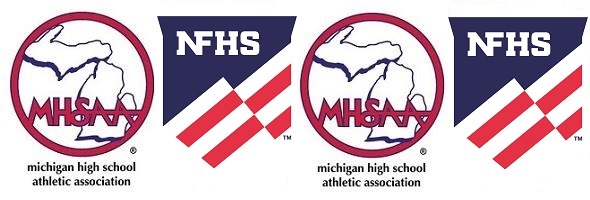
Adult Fans: HS Sports' Biggest Challenge
August 27, 2019


By Karissa Niehoff, NFHS Executive Director
and Mark Uyl, MHSAA Executive Director
Inappropriate adult behavior at high school athletic events in Michigan has reached epidemic proportion.
When more than 2,000 high school athletic directors were asked in a recent national survey what they like least about their job, 62.3 percent said it was “dealing with aggressive parents and adult fans.”
And the men and women who wear the black and white stripes agree. In fact, almost 80 percent of officials quit after the first two years on the job, and unruly parents are cited as the reason why. As a result, there is a growing shortage of high school officials here in Michigan, and in some sports like wrestling, swimming & diving and track & field, the shortage is severe. No officials means no more games.
If you are a parent attending a high school athletic event this fall, you can help by following these six guidelines:
1. Act Your Age. You are, after all, an adult. Act in a way that makes your family and school proud.
2. Don’t Live Your Life Vicariously Through Your Children. High school sports are for them, not you. Your family’s reputation is not determined by how well your children perform on the field of play.
3. Let Your Children Talk to the Coach Instead of You Doing It for Them. High school athletes learn how to become more confident, independent and capable — but only when their parents don’t jump in and solve their problems for them.
4. Stay in Your Lane. No coaching or officiating from the sidelines. Your role is to be a responsible, supportive parent — not a coach or official.
5. Remember, Participating in a High School Sport Is Not About Getting a College Scholarship. According to the NCAA, only about two percent of all high school athletes are awarded a sports scholarship, and the total value of the scholarship is only about $18,000.
6. Make Sure Your Children Know You Love Watching Them Play. Do not critique your child’s performance on the car ride home. Participating in high school sports is about character development, learning and having fun — not winning and losing.
Purchasing a ticket to a high school athletic event does not give you the right to be rude, disrespectful or verbally abusive. Cheer loud and be proud, but be responsible and respectful. The future of high school sports in Michigan is dependent on you.
The Michigan High School Athletic Association (MHSAA) is one of 51 members of the National Federation of State High School Associations (NFHS).

Is Your Teen Sleep-Deprived?
March 2, 2021
Many teens tend to stay up late. They’re on social media, watching television or YouTube, studying, or just tossing and turning for hours unable to fall asleep. Sleep can also be disrupted during stressful times during adolescence like exams or relationship problems.
More than two-thirds of high school students in the U.S. are failing to get sufficient sleep on school nights, according to a recent study from the Centers for Disease Control and Prevention (CDC).
“The American Academy of Sleep Medicine (AASM) recommends that teens should sleep eight to 10 hours per night on a regular basis to promote optimal health,” explains Virginia Skiba, M.D., a sleep specialist with the Henry Ford Health System. Insufficient sleep can have a negative impact on their grades, athletic performance and mental and physical well-being, including depression and anxiety issues and drug and alcohol use.
It’s a safety issue, as well. Motor vehicle crashes are a leading cause of teen deaths in the U.S. In a recent survey, more than half of teens admitted to having driven when feeling too tired and nearly one in 10 teens reported having fallen asleep at the wheel.
A typical high school student is biologically wired to fall asleep around 11 p.m. Many high schools in Michigan start school as early as 7 a.m. – long before a teen’s natural wake time. The AASM advocates a later middle school and high school start time of 8:30 a.m. or later.
Tips for a Good Night’s Sleep
Teenagers’ sleep-wake cycles are biologically determined – they are programmed to stay up late at night and sleep later in the morning. Most teens are instinctively night owls. Falling asleep is often a challenge, but there are things teens can do that may help them get a good night’s sleep.
Here are some tips from Dr. Skiba, which apply not only to teens but are great advice for anyone who is struggling with feeling sleep deprived:
► First and foremost, make sleep a priority. In our busy society, too often making time for sleep is last on the list.
► Maintain a consistent bedtime and wake time that allows at least eight hours of nightly sleep, including on weekends and vacation.
► Keep the bedroom quiet and dark. Keep the TV, computer, phone and video game system out of the bedroom.
► Set a technology curfew; turn off all devices one hour before bedtime.
► Engage in quiet activities before bed, like reading, journaling or yoga, and establish a relaxing bedtime ritual.
Dr. Virginia Skiba is a sleep medicine expert who sees patients at Henry Ford Medical Centers in Grosse Pointe and Sterling Heights.
If your teen is struggling with sleep issues, talk to your pediatrician or family doctor to find out if he or she could benefit from a sleep evaluation. Call 1-800-HENRYFORD (436-7936) or visit henryford.com to learn more.
Visit henryford.com/sports or call (313) 972-4216.


